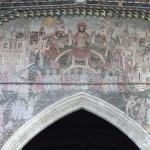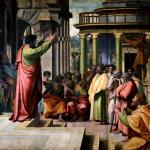Now when Jesus was born in Bethlehem of Judea in the days of Herod the king, behold, wise men from the East came to Jerusalem, saying, “Where is he who has been born king of the Jews? For we have seen his star in the East, and have come to worship him” (Matt. 2:1-2 RSV).
Pagan wise men “from the East” came to worship Jesus Christ. They were pagan mystics, Magi, magicians, who were skilled in the metaphysical arts. While, centuries later, the term magus would be seen as an evil thing, Marsilio Ficino reminded renaissance readers that the Gospels had no problem the title and honoring those who were themselves magi as the first ones to come and worship Jesus:
In this work the first of all were the Magi who worshiped Christ as his birth. Why, therefore, should you be afraid of the name ‘Magus,’ as if it were terrifying? It is a name pleasing to the Gospels, not something wicked and venomous, but signifying a wise man and a priest. Was not such a Magus the first worshiper of Christ?[1]
It sadly had become common for Christians to denigrate pagan myths and traditions, to reject any connection between Christianity and the pagans of old. When they do that, they undercut the work of Christ. He was the expectation of the nations (cf. Gen 49:10). The messiah, the incarnate God-man, completed the human condition, uniting all of humanity together; he prepared the way for that unity in and with all nations, and so all nations have something to hand over and give of themselves to Christ. Christians are to take and embrace all the partial truths, the rays of light found all over the world, and bring them together in Christ. What has been cut asunder by sin is to be made whole once again.
God was at work in and with all nations, preparing them in their own ways, for the coming of Christ; God was teaching everyone in their own ways, leading those who sought the truth, closer to him. Thus, St. John Chrysostom was able to reflect on the way God worked with skillful means with all the nations, each being directed in and of its own fashion, to come to the truth in Christ:
In imitation of this, Paul also reasons with the Greeks from an heathen altar, and brings forward testimonies from the poets. And not without circumcision does he harangue the Jews. Sacrifices he makes the beginning of his instruction to them that are living under the law. For, since to every one what is familiar is dear, both God, and the men that are sent by Him, manage things on this principle with a view to the salvation of the world. Think it not therefore unworthy of Him to have called them by a star; since by the same rule you will find fault with all the Jewish rites also, the sacrifices, and the purifications, and the new moons, and the ark, and the temple too itself. For even these derived their origin from Gentile grossness. Yet for all that, God, for the salvation of them that were in error, endured to be served by these things, whereby those without were used to serve devils; only He slightly altered them; that He might draw them off by degrees from their customs, and lead them towards the highest wisdom. Just so He did in the case of the wise men also, not disdaining to call them by sight of a star, that He might lift them higher ever after. Therefore after He has brought them, leading them by the hand, and has set them by the manger; it is no longer by a star, but by an angel that He now discourses unto them. Thus did they little by little become better men.[2]
The Magi, whose number we do not fully know, nor whether they all came to worship Christ at the same time, were religious prophets; through the guidance of God, they had been led to Jesus Christ. It would not be surprising if there were many of them, coming in several different waves through his infancy. The three famous wise men served as a representation of all the Magi. They were perhaps with Christ first, preparing the way for the rest. Perhaps it was because they were the wisest, the most prophetic in spirit that they were the ones reported in Scripture, for what we are told of them shows us not only their wisdom in how they dealt with Herod, but also their prophetic awareness in the gifts the gave to Christ:
Then Herod summoned the wise men secretly and ascertained from them what time the star appeared; and he sent them to Bethlehem, saying, “Go and search diligently for the child, and when you have found him bring me word, that I too may come and worship him.” When they had heard the king they went their way; and lo, the star which they had seen in the East went before them, till it came to rest over the place where the child was. When they saw the star, they rejoiced exceedingly with great joy; and going into the house they saw the child with Mary his mother, and they fell down and worshiped him. Then, opening their treasures, they offered him gifts, gold and frankincense and myrrh. And being warned in a dream not to return to Herod, they departed to their own country by another way. (Matt. 2:7-12 RSV).
Pagans had come to Christ with more wisdom and spiritual awareness than most Christians who would come afterwards; they came to worship the God-man by their gifts, revealing, as St. Hilary of Poitiers explained, the identity of Jesus in and through them (whether or not they intended to do so):
Then there follows the offering of gifts, which represented their awareness of Christ’s full identity: the gold proclaims him as King, the incense as God, and the myrrh as man. And so through the Magi’s veneration [of him], the understanding of every mystery is summed up concerning his death as man, of his resurrection as God, about his judgment as King. [3]
It was, according to St. Anthony of Padua, done in fulfillment of prophecy:
This prophecy in Isaiah 18 refers to the conversion of the Gentiles, whose first-fruits (the Magi) today brought gifts of gold, frankincense and myrrh to Jesus Christ, the Lord of the angelic hosts.[4]
The Magi, representing the heathen, show how the heathen with their wisdom could connect with the true prophetic spirit and be led beyond their traditions (mixed, as they were, with good and bad) to the fullness of truth in Christ. The Magi were the first fruits of the world-harvest of God. They came to love, honor and worship Christ; their love of wisdom opened them up to the Wisdom of God whereby they show how even in the pagan traditions, God can be and will be honored. We must not fear any similarity or pagan connections found in the Christian faith. For it is clear, Christ has welcome them as he welcomed the Magi. Who are we to deny what Christ has not only accepted but raised up in glory?
[Image=The Magi by anonymous (scan from guide book “Cappadokia”) [Public domain], via Wikimedia Commons]
[1] Marsilio Ficino, The Book of Life. Trans. Charles Boer (Woodstock, Connecticut: Spring Publications, 1996), 186.
[2] St. John Chrysostom, Homilies On Matthew in NPNF1(10): 38.
[3] St. Hilary of Poitiers, Commentary on Matthew. Trans. D.H. Williams (Washington, DC: CUA Press, 2012), 46.
[4] St. Anthony of Padua, Sermons for Sundays and Festivals: Volume IV. Trans. Paul Spilsbury (Padua: Edizioni Messaggero Padova, 2010), 85. St. Anthony of Padua is referencing Isaiah 18:7: “At that time gifts will be brought to the LORD of hosts from a people tall and smooth, from a people feared near and far, a nation mighty and conquering, whose land the rivers divide, to Mount Zion, the place of the name of the LORD of hosts” (RSV).
Stay in touch! Like A Little Bit of Nothing on Facebook












